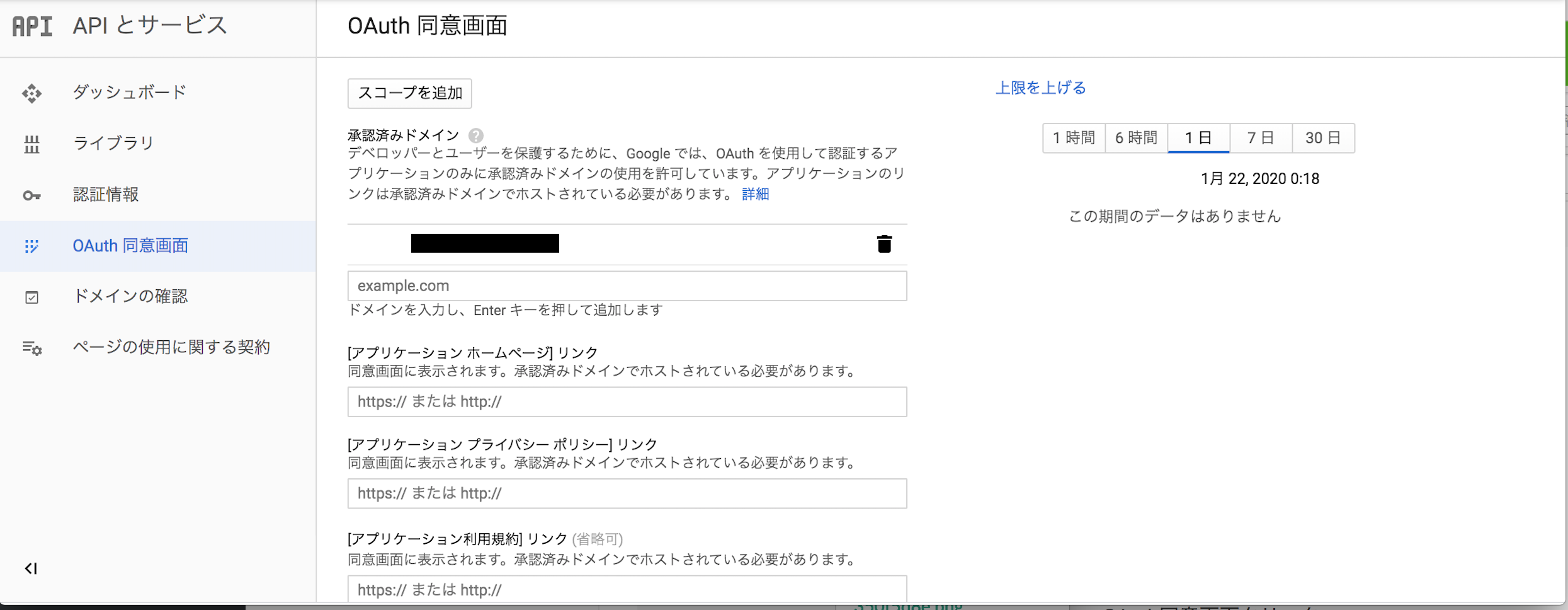gem deviseを使ったグーグル認証によるログイン実装
簡易的にログイン機能を実装してみます。
環境構築
新ディレクトリ作成
ディレクトリに移動して
$ bundle init
gem 'rails'
$ bundle install
$ bundle exec rails db:create
$ rbenv global 2.6.3
$ rbenv rehash
$ rails new . --skip-test
実装前準備
①gcp(google cloud platform)設定
- グーグルアカウントでログイン
こんな画面が現われます。
- OAuth同意画面
→アプリケーション名、承認済みドメイン入力
→承認済みドメインは外部からのアクセスを可能にするために 後ほどngrokでドメインを設定します
(ngrokのサーバー接続画面のforwarding部分のドメインです)
- 認証情報を作成
→承認済みの JavaScript 生成元 URI
localhost:3000
→承認済みのリダイレクト URI
http://localhost:3000/users/auth/google_oauth2/callback
②ngrok設定
- ngrokページから、signup(新規登録)
・ダウンロードngrok
→ZIPファイルダウンロード
・解凍してインストール
→ngrok.zipをダブルクリック
・アカウントを接続する
$cd ~/Downloads/
でダウンロードディレクトリへ移動
→
- サーバへ
→
$ ./ngrok http 3000
実装
$ rails g controller static_pages home
Rails.application.routes.draw do
root to: "static_pages#home"
get 'static_pages/home'
# For details on the DSL available within this file, see https://guides.rubyonrails.org/routing.html
end
-
gem 'devise' をインストール
-
$ rails g devise:install -
$ rails g devise user
- フラッシュメッセ追加
app/views/layouts/application.html.erb.に
<p class="notice"><%= notice %></p>
<p class="alert"><%= alert %></p>
を追加
- トップページ
<h1>StaticPages#home</h1>
<% if user_signed_in? %>
<%= link_to "Sign out", destroy_user_session_path, method: :delete %>
<% else %>
<%= link_to "Sign in", new_user_session_path %>
<% end %>
<!DOCTYPE html>
<html>
<head>
<title>TwitterAuthExample</title>
<%= csrf_meta_tags %>
<%= csp_meta_tag %>
<%= stylesheet_link_tag 'application', media: 'all', 'data-turbolinks-track': 'reload' %>
<%= javascript_pack_tag 'application', 'data-turbolinks-track': 'reload' %>
</head>
<body>
<p class="notice"><%= notice %></p>
<p class="alert"><%= alert %></p>
<%= yield %>
</body>
</html>
- 認証情報
承認済みのリダイレクト URI
http://localhost:3000/users/auth/google_oauth2/callback
- credentialsにキーなどの情報を記載
$ EDITOR="vim" rails credentials:edit
google_oauth2:
client_id: xxxxx
client_secret: xxxxx
コンソールで
Rails.application.credentials
を実行して確認
gem 'omniauth-google-oauth2'
をインストール
config/initializer/devise.rb
以下を追加
config.omniauth :google_oauth2, Rails.application.credentials.google_oauth2[:client_id], Rails.application.credentials.google_oauth2[:client_secret], scope: 'email', redirect_url: "#{ENV['HOST']}/users/auth/google_oauth2/callback"
class User < ApplicationRecord
devise :database_authenticatable, :registerable,
:recoverable, :rememberable, :validatable,
:omniauthable, omniauth_providers: [:google_oauth2]
def self.from_omniauth(auth)
where(provider: auth.provider, uid: auth.uid).first_or_create do |user|
user.email = auth.info.email
user.password = Devise.friendly_token[0,20]
end
end
end
$ rails g migration add_oauth_columns_to_users
マイグレーションファイルの中身
class AddOauthColumnsToUsers < ActiveRecord::Migration[6.0]
def change
add_column :users, :provider, :string
add_column :users, :uid, :string
end
end
Rails.application.routes.draw do
devise_for :users, controllers: {
omniauth_callbacks: 'users/omniauth_callbacks'
}
root to: "static_pages#home"
devise_scope :user do
get '/users/sign_out' => 'devise/sessions#destroy'
end
get 'static_pages/home'
end
$ rails g devise:controllers users -c=omniauth_callbacks
omniauth_callbacks_controller.rb
class Users::OmniauthCallbacksController < Devise::OmniauthCallbacksController
def google_oauth2
@user = User.from_omniauth(request.env['omniauth.auth'])
if @user.persisted?
flash[:notice] = I18n.t 'devise.omniauth_callbacks.success', kind: 'Google'
sign_in_and_redirect @user, event: :authentication
else
session['devise.google_data'] = request.env['omniauth.auth'].except(:extra) # Removing extra as it can overflow some session stores
redirect_to new_user_registration_url, alert: @user.errors.full_messages.join("\n")
end
end
end







